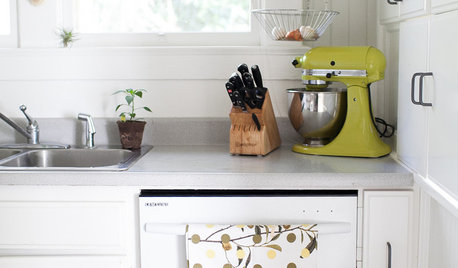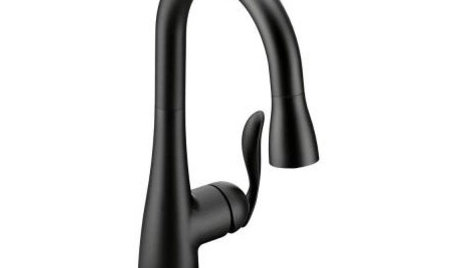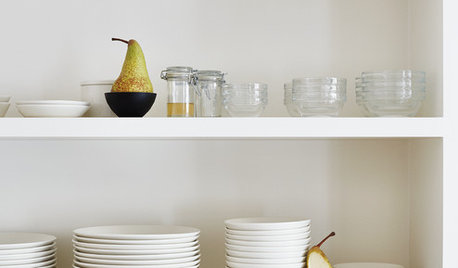Why can't I put knives in the dishwasher?
try_hard
16 years ago
Related Stories

THE POLITE HOUSEThe Polite House: Can I Put a Remodel Project on Our Wedding Registry?
Find out how to ask guests for less traditional wedding gifts
Full Story
HOUSEKEEPINGDishwasher vs. Hand-Washing Debate Finally Solved — Sort Of
Readers in 8 countries weigh in on whether an appliance saves time, water and sanity or if washing by hand is the only saving grace
Full Story
HOUSEKEEPINGTackle Big Messes Better With a Sparkling-Clean Dishwasher
You might think it’s self-cleaning, but your dishwasher needs regular upkeep to keep it working hard for you
Full Story
KITCHEN DESIGNWhere Should You Put the Kitchen Sink?
Facing a window or your guests? In a corner or near the dishwasher? Here’s how to find the right location for your sink
Full Story
PRODUCT PICKSGuest Picks: 19 Kitchen Upgrades for When You Can't Afford an Overhaul
Modernize an outdated kitchen with these accents and accessories until you get the renovation of your dreams
Full Story
PETS5 Finishes Pets and Kids Can’t Destroy — and 5 to Avoid
Save your sanity and your decorating budget by choosing materials and surfaces that can stand up to abuse
Full Story
KITCHEN DESIGNDouble Islands Put Pep in Kitchen Prep
With all that extra space for slicing and dicing, dual islands make even unsavory kitchen tasks palatable
Full Story
MORE ROOMSWhere to Put the TV When the Wall Won't Work
See the 3 Things You'll Need to Float Your TV Away From the Wall
Full Story
LIFEYou Said It: ‘Put It Back’ If It Won’t Help Your House, and More Wisdom
Highlights from the week include stopping clutter from getting past the door, fall planting ideas and a grandfather’s gift of love
Full Story
LIFEThe Polite House: How Can I Tell a Construction Crew to Pipe Down?
If workers around your home are doing things that bother you, there’s a diplomatic way to approach them
Full StoryMore Discussions







zl700
weissman
Related Professionals
Ballenger Creek Kitchen & Bathroom Designers · Frankfort Kitchen & Bathroom Designers · Plymouth Kitchen & Bathroom Designers · Albuquerque Kitchen & Bathroom Remodelers · Dearborn Kitchen & Bathroom Remodelers · Galena Park Kitchen & Bathroom Remodelers · Jefferson Hills Kitchen & Bathroom Remodelers · Roselle Kitchen & Bathroom Remodelers · Santa Fe Kitchen & Bathroom Remodelers · Winchester Kitchen & Bathroom Remodelers · North Chicago Kitchen & Bathroom Remodelers · Glenn Heights Kitchen & Bathroom Remodelers · Kaneohe Cabinets & Cabinetry · Murray Cabinets & Cabinetry · North New Hyde Park Cabinets & Cabinetryjohn_com
try_hardOriginal Author
weissman
mccall
olympiceagle
try_hardOriginal Author
louisianapurchase
capecodcook
rhome410
moose_2007
User
jejvtr
rhome410
pugger
User
capecodcook
cpovey
jimonthebeach
edlakin
cpovey
asolo
jimonthebeach
sholt576
solarpowered
edlakin
jimonthebeach
chefkev
kaseki
edlakin